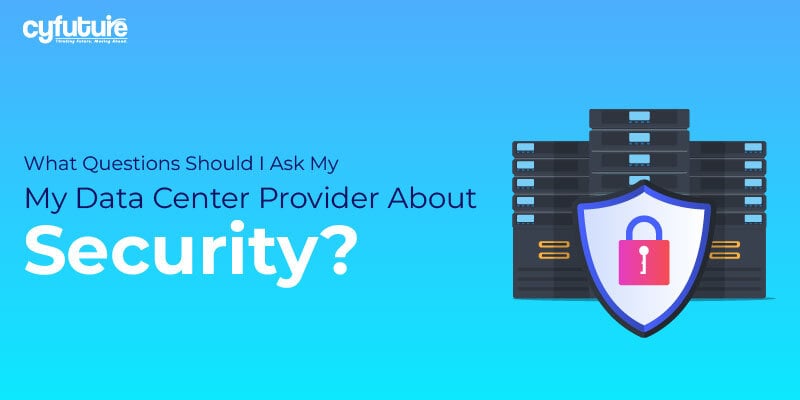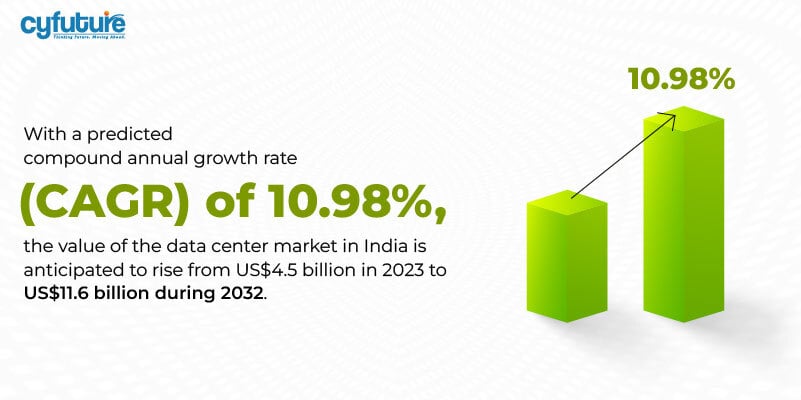-
Get Cloud GPU Server - Register Now!
Toggle navigation

Nowadays, data security is one of the biggest concerns for several organizations across the globe. This is because companies rapidly keep up with the changing face of digitization. Yet, with the increasing volume of data being generated every day, companies are now looking to third-party data centers that offer safe and secure data storage solutions.
However, the question is, how secure your data is? As more organizations from all sectors rely on cloud-based infrastructure, it no longer remains an optional solution to ensure your valuable assets get the data center where they are hosted and have more than adequate security measures in place.
If it’s Mumbai or any other place, then finding the right data center provider for your company is a significant aspect of its overall cybersecurity strategy. Moreover, the threat of cyber-attacks, data breaches, and natural disasters must make you ensure that your provider will protect your data and reputation as well. Therefore, ask the right questions before committing to a provider: It will let you assess their security capabilities and place your data in safe hands.
In this comprehensive blog post, we’ll walk you through the key questions you should ask your data center provider about security. Additionally, here are some questions on security issues, from physical security to cybersecurity measures and more compliance. It will help answer your indecisiveness as to which place you will host your data and how secure it is.
However, let’s take a look into a few stats and data before delving deep.

Now, let’s delve into the deep knowledge pool.
Security certifications are essential indicators to determine how committed a data center provider is to keeping their best practices concerning data protection. Furthermore, inquiring about your provider possibilities, ask questions about ISO/IEC 27001, SSAE 18 SOC 2 Type II, PCI-DSS, and several others.
This is because these will show their ability to hold themselves up to international standards of security. Additionally, it will help to bring you that much-needed peace of mind knowing they could be able to provide a safe environment for your data.
Why it matters: Certification is an indicator that the provider has passed rigorous testing and auditing for security standards. It further implies the provider maintains changing, updated protection guidelines based on new threats that are introduced continuously.
One of the most important areas to research is the security of a data center’s physical security. Data centers contain large volumes of business-critical data on-site, which makes them particularly attractive targets to cybercriminals as well as to potential physical intruders. Ask your provider about physical security measures around the facility: Questions include:
How is access to the data center controlled? Verify that only authorized personnel have access to the facility. Biometric scanning, smart card access, and multi-factor authentication should be the standard.
What are perimeter security measures? Questions about fencing, surveillance cameras, motion detectors, and security guards at the perimeter of the facility are all ways of discouraging unauthorized access.
Is the facility equipped with environmental controls? Check if the data center has mechanisms in place to detect fires, flooding, and other physical hazards that can damage your infrastructure or data.
With business infrastructure booming rapidly in Mumbai, there is a need to understand the physical security of a Data Center in Mumbai on account of natural disasters such as flooding and earthquakes as well as urban risks that include theft and vandalism.
Cybersecurity is at the core of the operations of any data center in modern times. Data breaches or cyber-attacks could lead to severe financial and reputational loss. So, ask your provider how they prevent unauthorized access and keep your data safe from cyber threats. Some questions you must ask them include:
What kind of firewalls, intrusion detection systems, and intrusion prevention systems do you use? These tools have become very important in today’s monitoring of network traffic and warding off attacks.
How are encryption and data masking implemented? You will want to know what encryption protocols protect data at rest and data in transit so that breaches cannot happen.
Do you have a security operations center? A 24/7 SOC can monitor and respond to security incidents in real time, reducing the opportunity for an attack to be successful.
Do you have an incident response plan? A good response plan will help to minimize damage from a breach, outlining immediate actions and communication strategies, along with specific recovery processes.
Then, your service provider should be rated for offering cloud security solutions. These services generally contain advanced features like DDoS mitigation features, network segmentation, and continuous monitoring for ensuring the secured position of data in the cloud infrastructure.
Human error is often the number one cause of data breaches, so you must ensure the staff working within your data center are trained to avoid security risks. Ask your provider:
What training programs are in place for your employees regarding data security? It is very important that all your employees – whether it is a network engineers or security personnel – are trained with all the latest security protocols and best practices.
How often do employees undergo security awareness training? Cyber threats are continuously evolving, so ongoing education and training for employees is vital to mitigate risk.
A well-trained team helps in the prevention and detection of security threats before they become worse.
The security of your data is not just about preventing attacks—it’s also about ensuring your data is recoverable in case of an unforeseen disaster. Natural disasters, power outages, or cyberattacks can lead to data loss, so having a robust backup and disaster recovery plan is essential. Key questions to ask include:
What is your data backup strategy? Ensure that your provider has an automated and redundant backup system to protect against data loss.
Where are the backup servers located? Consider the geographic location of backup data centers. Multiple, geographically diverse locations help protect against regional disasters.
How quickly can you restore data in the event of an outage? Ask about recovery time objectives (RTO) and recovery point objectives (RPO) to ensure that data can be restored promptly with minimal loss.
Providers who offer Cloud Security Services should also have cloud-based disaster recovery solutions in place, allowing for fast data recovery in the event of an outage or attack.
Data security is not just a best practice but also adherence to legal and industry standards. There are frequently specific regulatory requirements that can be unique to your industry, and your data center will be expected to adhere to them. Some of the relevant questions in this regard are:
Are you GDPR (General Data Protection Regulation), HIPAA (Health Insurance Portability and Accountability Act), or industry-specific complaints? Data compliance certifies data is handled according to conformity with legal and industry-specific privacy requirements.
Do you have documentation or certificates to support the assertion of compliance? Ask them for certificates such as ISO 27001, SSAE 18 SOC 2, and/or PCI DSS to prove the data center’s conformity to widely recognized security standards.
Compliance is not merely the avoidance of penalties but also helps ensure that your provider has robust measures in place to protect sensitive data.
Even if data is no longer needed, it is still critical that it is disposed of securely to avoid any future security risks. You should ensure proper data retention and disposal through the following questions to the data center provider:
How long do you keep customers’ data? Knowing their retention period will help in effectively and properly managing such data, especially if they carry personal or sensitive information.
What procedures are in place for data disposal? Ask what is done when it no longer is needed, in a manner that erases it so that it cannot be accessed or reconstructed by the wrong people.
Network reliability is closely related to data security. Without proper uptime and availability, business operations may be interrupted, which creates potential security risks. Make sure that your data center provider offers the following:
What is your uptime guarantee? The best data centers have a Service Level Agreement with a 99.9% or better uptime guarantee in place that ensures that your systems are up.
Do you have a redundant network architecture? Network redundancy decreases the possibility of systems becoming unavailable due to system failures, thus making the service always available.
Transparency regarding data security is also essential. You can ask your provider whether they offer access to security audits and reports or conduct regular vulnerability assessments. This implies you could track whether or not the security measures of the data center you are renting from work and if so, adjust accordingly.
Last but not least, choosing a secure data center provider is probably a crucial decision you will ever make. With the growing threat landscape, it is very important to vet potential providers seriously by asking the right questions from them regarding their security protocols. From that point of view, every little thing matters: from physical security to cloud services and compliance.
If you are looking for a reliable Data Center provider in Mumbai, ensure that they provide the security features necessary to protect your sensitive information. After all, an excellent partnership with your data center provider can offer you the peace of mind that your data is in good hands, and that growing your business would not be the issue.